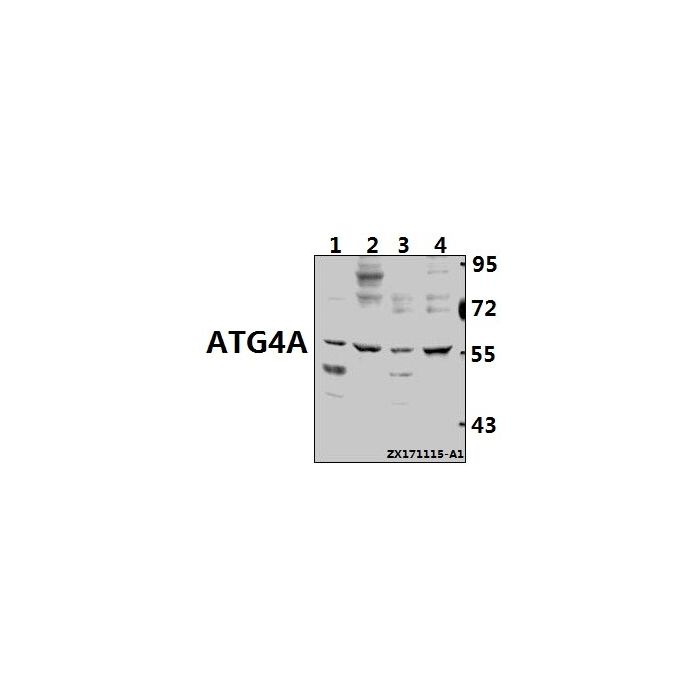ATG4A polyclonal, anti-human, mouse, rat
€388.00
In stock
SKU
BS7735
Background:
Autophagy, a process that results in the lysosomal-dependent degradation of cytosolic compartments, is carried out by the autophagosome, which is a double-membrane vesicle whose formation is catalyzed by several autophagy-related gene (Atg) proteins. Atg4a (ATG4 autophagy related 4 homolog A), also known as APG4A or AUTL2, is a 398 amino acid protein that localizes to the cytoplasm and belongs to the peptidase C54 family. Expressed in a variety of tissues, including brain, skeletal muscle and fetal liver, Atg4a functions as a cysteine protease that cleaves the C-terminal part of target proteins, such as GABARAP and MAP1LC3, and plays an essential role in autophagy. Atg4a exists as multiple alternatively spliced isoforms and is functionally inhibited by N-ethylmaleimide.
Alternative Name:
Apg4a, ATG4 autophagy related 4 homolog A (S. cerevisiae), ATG4A, ATG4A_HUMAN, Atg4al, AUT like 2 cysteine endopeptidase, AUT-like 2 cysteine endopeptidase, Autl2, Autophagin 2, Autophagin-2, Autophagy related 4A cysteine peptidase, Autophagy related cysteine endopeptidase 2, Autophagy related protein 4 homolog A, Autophagy-related cysteine endopeptidase 2, Autophagy-related protein 4 homolog A, AV169859, Cysteine protease ATG4A, hAPG4A,
Application Dilution: WB: 1:1000 - 1:2000
Specificity: ATG4A polyclonal antibody detects endogenous levels of ATG4A protein.
Immunogen:
Recombination protein , corresponding to amino acids 38-186 of Human ATG4A.
MW: ~ 45 kDa
Swis Prot.: Q8WYN0
Purification & Purity:
The antibody was affinity-purified from rabbit antiserum by affinity-chromatography using epitope-specific immunogen and the purity is > 95% (by SDS-PAGE).
Format:
1mg/ml in PBS with 0.1% Sodium Azide, 50% Glycerol.
Storage:
Store at 4°C short term. Aliquot and store at -20°C long term. Avoid freeze-thaw cycles.
For research use only, not for use in diagnostic procedure.
Autophagy, a process that results in the lysosomal-dependent degradation of cytosolic compartments, is carried out by the autophagosome, which is a double-membrane vesicle whose formation is catalyzed by several autophagy-related gene (Atg) proteins. Atg4a (ATG4 autophagy related 4 homolog A), also known as APG4A or AUTL2, is a 398 amino acid protein that localizes to the cytoplasm and belongs to the peptidase C54 family. Expressed in a variety of tissues, including brain, skeletal muscle and fetal liver, Atg4a functions as a cysteine protease that cleaves the C-terminal part of target proteins, such as GABARAP and MAP1LC3, and plays an essential role in autophagy. Atg4a exists as multiple alternatively spliced isoforms and is functionally inhibited by N-ethylmaleimide.
Alternative Name:
Apg4a, ATG4 autophagy related 4 homolog A (S. cerevisiae), ATG4A, ATG4A_HUMAN, Atg4al, AUT like 2 cysteine endopeptidase, AUT-like 2 cysteine endopeptidase, Autl2, Autophagin 2, Autophagin-2, Autophagy related 4A cysteine peptidase, Autophagy related cysteine endopeptidase 2, Autophagy related protein 4 homolog A, Autophagy-related cysteine endopeptidase 2, Autophagy-related protein 4 homolog A, AV169859, Cysteine protease ATG4A, hAPG4A,
Application Dilution: WB: 1:1000 - 1:2000
Specificity: ATG4A polyclonal antibody detects endogenous levels of ATG4A protein.
Immunogen:
Recombination protein , corresponding to amino acids 38-186 of Human ATG4A.
MW: ~ 45 kDa
Swis Prot.: Q8WYN0
Purification & Purity:
The antibody was affinity-purified from rabbit antiserum by affinity-chromatography using epitope-specific immunogen and the purity is > 95% (by SDS-PAGE).
Format:
1mg/ml in PBS with 0.1% Sodium Azide, 50% Glycerol.
Storage:
Store at 4°C short term. Aliquot and store at -20°C long term. Avoid freeze-thaw cycles.
For research use only, not for use in diagnostic procedure.
| Is Featured? | No |
|---|
Write Your Own Review

